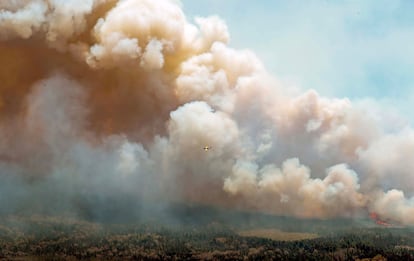Drought, wind and high temperatures: ‘Unprecedented’ wave of wildfires wreaks havoc in Canada
Quebec joins the list of provinces affected by the blaze. More than 3.3 million hectares burned in 2023, and the Trudeau government is preparing new contingency plans for the summer


The wave of wildfires continues to wreak havoc in Canada, while drought, high temperatures and strong winds are fueling the flames. Quebec has joined the list of affected provinces in recent days. At a press conference in Ottawa on Monday, Canadian Prime Minister Justin Trudeau described the wave as “unprecedented” for this time of year. So far in 2023, more than 3.3 million hectares in the country have been burned. Trudeau also pointed out that, according to projections, the scenario could worsen “throughout the summer,” so his government is making various contingency plans.
The province of Quebec currently has 154 active fires. This brings the total for 2023 so far to 420, while the average for the last 10 years over the same period was 199. The fires have spread especially in the regions of Abitibi-Témiscamingue, North Coast, Saguenay-Lac-Saint-Jean and Northern Quebec. More than 11,000 people have been evacuated, mostly residents of indigenous communities and small towns.
Forest Fire Protection Society personnel and aircraft are fighting the blazes and members of the Canadian Armed Forces are providing support, as they have done in Alberta and Nova Scotia. Quebec premier François Legault asked people to stay away from wooded areas and not to light fires in the open air. He also warned of the effects caused by smoke, as it has moved hundreds of miles away from the fires. “We have problems with air quality even in Montreal,” he noted. The smoke has already crossed the Canadian border, impacting cities in the northern United States and even darkening the skies over New York City on Tuesday.
Last Saturday, the provincial government of Alberta announced the end of the state of emergency decreed on May 6. However, the province still has 60 active fires; British Columbia is confronting 80 and Saskatchewan is dealing with 23. Although rains in recent days have improved the situation in Nova Scotia, firefighters have been unable to control the Shelburne County fire, the largest on record in the Atlantic province.
Le Canada fait face à de terribles incendies.
— Emmanuel Macron (@EmmanuelMacron) June 4, 2023
La France est solidaire. Une centaine de nos soldats du feu se préparent à aller combattre les flammes aux côtés de leurs camarades québécois. Des experts sont aussi mobilisés.
Amis canadiens, les renforts arrivent.
Prime Minister Trudeau stated: “We’re going to get through this together, and our government will keep being there with whatever it takes to keep people safe and provide support.” More than 3,000 Canadian firefighters are involved. Around 900 have come from the United States, Australia, New Zealand, South Africa and France to provide supplementary assistance. Nearly 120,000 people have been evacuated in the affected provinces during the first months of 2023 due to the flames and smoke.
Experts from Environment Canada stress that climate change has contributed to an increase in the frequency and intensity of forest fires. At a meeting that Trudeau and several members of the government had with journalists on Monday in Ottawa, Minister of Natural Resources Jonathan Wilkinson noted: “We are living in a new reality. A reality in which we have to listen carefully to what science tells us.”
Sign up for our weekly newsletter to get more English-language news coverage from EL PAÍS USA Edition
Tu suscripción se está usando en otro dispositivo
¿Quieres añadir otro usuario a tu suscripción?
Si continúas leyendo en este dispositivo, no se podrá leer en el otro.
FlechaTu suscripción se está usando en otro dispositivo y solo puedes acceder a EL PAÍS desde un dispositivo a la vez.
Si quieres compartir tu cuenta, cambia tu suscripción a la modalidad Premium, así podrás añadir otro usuario. Cada uno accederá con su propia cuenta de email, lo que os permitirá personalizar vuestra experiencia en EL PAÍS.
¿Tienes una suscripción de empresa? Accede aquí para contratar más cuentas.
En el caso de no saber quién está usando tu cuenta, te recomendamos cambiar tu contraseña aquí.
Si decides continuar compartiendo tu cuenta, este mensaje se mostrará en tu dispositivo y en el de la otra persona que está usando tu cuenta de forma indefinida, afectando a tu experiencia de lectura. Puedes consultar aquí los términos y condiciones de la suscripción digital.








































